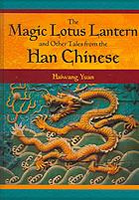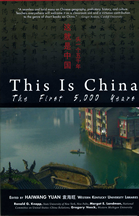| Proverbs |
Annotation
And Connotations |
With
the liver and bowel broken into inches.
(Chinese
original: 肝肠寸断; Chinese Pinyin:  Gān-cháng-cùn-duàn.) Gān-cháng-cùn-duàn.) |
Another way of saying "heart-broken" |
- When
the head rope of a net is pulled up, all the meshes open.
(Chinese
original: 纲举目张; Chinese Pinyin:  Gāng-jǔ-mù-zhāng.) Gāng-jǔ-mù-zhāng.)
|
- When
a key problem is solved, the rest of the issues relating
to it will also be unknotted.
|
- You
can't expect both ends of a sugar cane are as sweet.
(Chinese
original: 甘蔗没有两头甜;
Chinese Pinyin:  Gānzhe méiyǒu liǎng tóu tián.) Gānzhe méiyǒu liǎng tóu tián.)
|
- You can't
have both: In order to get something, you have to sacrifice something
else.
|
- Pouring
water from above the roof of a tall building.
(Chinese
original: 高屋建瓴; Chinese Pinyin:  Gāo-wū-jiàn-líng.) Gāo-wū-jiàn-líng.)
|
- If someone
can pour water from the top of a roof, he is in an extremely advantageous
position.
|
- Watch
the fire burn on the other side of the river.
(Chinese
original: 隔岸观火; Chinese Pinyin:  Gé-àn-guān-huǒ.) Gé-àn-guān-huǒ.)
|
- Gloating
over others' mishap instead of coming to their rescue.
|
- Flowers
look different in different eyes.
(Chinese
original: 各花入各眼; Chinese Pinyin:  Gè huā rù gè yǎn.) Gè huā rù gè yǎn.)
|
- Beauty
is in the eye of the beholder.
|
- There
are always ears on the other side of the wall.
(Chinese
original: 隔墙有耳; Chinese Pinyin:  Gé-qiáng-yǒu-ěr.) Gé-qiáng-yǒu-ěr.)
|
- Walls have ears .
|
Scratching
an itch from outside the boot.
(Chinese
original: 隔靴搔痒;Chinese Pinyin:  Gé-xuē-sāo-yǎng.) Gé-xuē-sāo-yǎng.) |
To scratch
one's itch with boots on is to attempt a very ineffective solution to
a problem. |
- A
weir close to completion left undone due to the shortage
of a basket of earth.
(Chinese
original: 功亏一篑; Chinese Pinyin:  Gōng-kuī-yī-kuì.) Gōng-kuī-yī-kuì.)
|
- A
regrettable failure of something nearing accomplishment
due to lack of perseverance.
|
- A
dog won't forsake his master because of his poverty; a son
never deserts his mother for her homely appearance
(Chinese original: 狗不嫌家贫,儿不嫌母丑; Chinese Pinyin:  Gǒu bū xián jiā pín, ér bū xián mǔ chǒu.) Gǒu bū xián jiā pín, ér bū xián mǔ chǒu.)
|
Don't
despise something or someone that is close to you. |
- A
dog will jump over a wall when cornered.
(Chinese original: 狗急跳墙; Chinese Pinyin:  Gǒu jí
tiào qiáng.) Gǒu jí
tiào qiáng.)
|
When cornered, one can do something desperate. This proverb is used in a derogatary manner. |
- A
fierce dog ruins a liquor store business.
(Chinese original: 狗猛酒酸; Chinese Pinyin:  Gǒu-měng-jiǔ-suān.) Gǒu-měng-jiǔ-suān.)
|
A once successful
liquor store suddenly sees its business faltering: customers stop coming.
Finally the owner realizes that it was his fierce dog that has scared
them away. A bad company may drive other friends away. Another dog-related
proverb that does injustice to the animal.
|
- A
mouse-catching dog steps on the cats' paws (toes).
(Chinese original: 狗拿耗子—多管闲事 Chinese Pinyin:  Gǒu ná hàozi—duō guǎn xiánshì.) Gǒu ná hàozi—duō guǎn xiánshì.)
|
- Despite
the fact that dogs do catch mice, people still believe that is the business
of cats'. Therefore, this proverb refers to someone who is too inquisitive
and cares about things that are none of his business.
|
- How
can you expect to find ivory in a dog's mouth?
(Chinese original: 狗嘴里吐不出象牙; Chinese Pinyin:  Gǒu
zuǐlǐ tǔ bù chū xiàngyá.) Gǒu
zuǐlǐ tǔ bù chū xiàngyá.)
|
- True,
that is an impossibility. The connotation is you can not expect people
of evil intent to utter anything good. By the way, in the Chinese culture,
dogs are almost always negative in allusions.
|
- Dismantle
the bridge after crossing it.
(Chinese original: 过河拆桥; Chinese Pinyin:  Guò-hé-chāi-qiáo.) Guò-hé-chāi-qiáo.)
|
- Isn't
that ungrateful and mean? There are people who after taking advantage
of you turn their back to you.
|
- Look
at a leopard through a pipe.
(Chinese original: 管中窥豹; Chinese Pinyin:  Guǎn-zhōng-kuì-bào.) Guǎn-zhōng-kuì-bào.)
|
- You can
add to the rest through your imagination. This proverb means that one
can tell the entirety by looking at part of it. Note, it has a commendatory
rather than a derogatory connotation.
|
- One
palm makes no applause.
(Chinese original: Chinese Pinyin: 孤掌难鸣; Chinese
Pinyin:  Gū-zhǎng-nán-míng.) Gū-zhǎng-nán-míng.)
|
- This
is an admonishment against both parties in a dispute: the dispute would
be impossible without either party.
|





